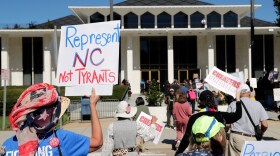Two transgender people and a lesbian law professor filed a federal lawsuit on Monday challenging a new North Carolina law that requires public school students to use bathrooms assigned to their biological sex and blocks local governments from passing anti-discrimination rules.
The filing argues that the law violates the equal protection and due process clauses of the 14th Amendment, discriminating against certain groups because of their gender or orientation and threatening their personal safety.
The plaintiffs, joined by two civil rights groups, said they worked over the weekend to challenge the law quickly after legislators approved it in a one-day special session and Republican Gov. Pat McCrory signed it.
“I have been denied a fundamental right that impacts me and many more in this state, multiple times a day, in our place of work and daily life,” said Joaquín Carcaño, a 27-year-old transgender man and plaintiff in the case.
The Republican-led General Assembly met for an extraordinary session last Wednesday, and approved a bill that overturned a city of Charlotte ordinance that allowed transgender people to use restrooms that aligned with their gender identity. Supporters said they wanted to reign in a local government that they argued had overextended its authority, and wanted to protect the privacy of women and children in public restrooms and locker rooms. McCrory signed the law that night.
Almost instantly, national newspaper editorials and major employers across the state blasted the new law. Red Hat, Bayer and Biogen denounced the bill on Twitter, while American Airlines, Wells Fargo, Apple and Microsoft signed a statement opposing “anti-LGBT” legislation.
By the weekend, McCrory’s office issued a Q&A outlining the governor’s points and instructed cabinet agencies to send out the email to state employees across North Carolina. His re-election campaign also distributed the email. The email said much of the response to the law was a coordinated effort to slander the state.
“The governor will continue to set the record straight on a common sense resolution to local government overreach that imposed new regulations on businesses that intruded into the personal lives of our citizens,” said Graham Wilson, a McCrory spokesman, on Monday.
In a statement, Senate Leader Phil Berger and House Speaker Tim Moore echoed a point Republican lawmakers emphasized before they approved the bill: the law seeks to protect women and young girls from sharing bathrooms with men. Rep. Dan Bishop of Mecklenburg County, the lead sponsor of the bill, declined to comment on the suit on Monday.
“We are confident the court will find the General Assembly acted properly in accordance with existing state and federal law," Berger and Moore said in the statement.
But transgender plaintiffs said lawmakers are demonizing them with bogus claims of bathrooms risks, and that transgender people are now the ones at risk.
The lawsuit says Carcaño used a designed men’s restroom at work at the University of North Carolina at Chapel Hill and another plaintiff, Grey McGarry, a 20-year-old student at the University of North Carolina at Greensboro, used a campus locker room without any problems before the law was passed. The new law will force Carcaño and McGarry will have to search for bathrooms in other buildings, and may have to disclose that they are transgender, which could lead to violence and harassment, the court complaint says.
“With House Bill 2, Gov. McCrory and the bill's supporters have sent a message that LGBT people are second class citizens who are undeserving of the privacy, respect and dignity afforded to others in the state,” Chris Brook, an attorney with the ACLU of North Carolina said.










